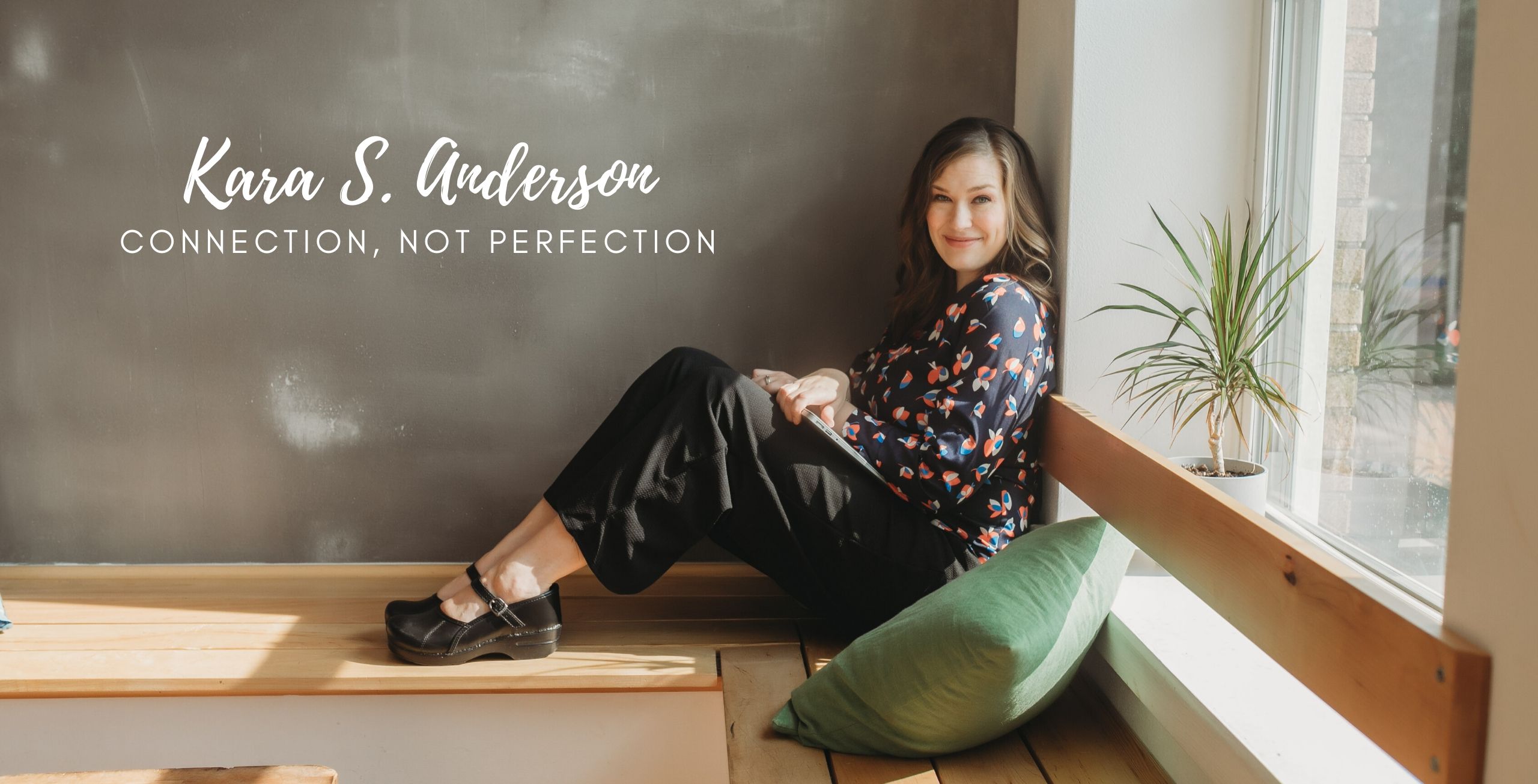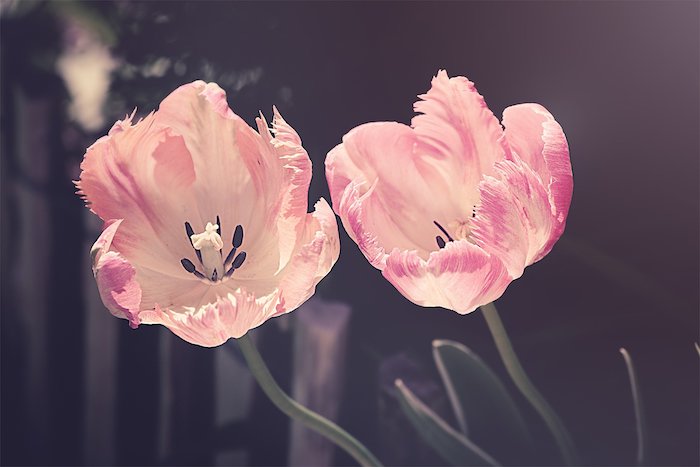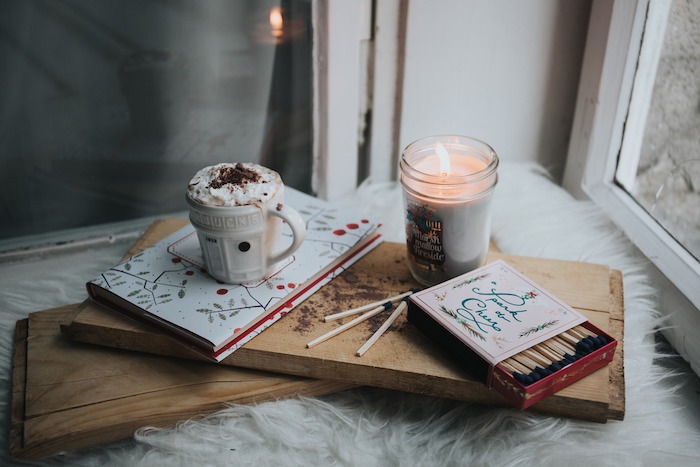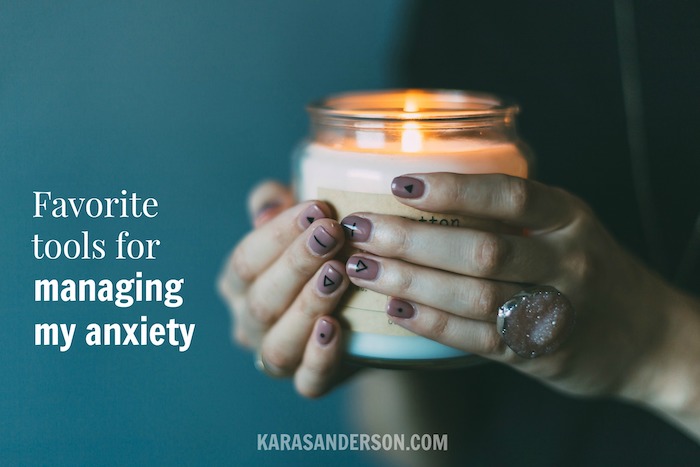
On Thursday, I woke up with dread.
But I didn’t feel anxious. I felt down. I didn’t really want to get out of bed.
So I did all my first-step things for when I have a rocky morning.
I got up and made tea. I started my diffuser with some oils for encouragement – peppermint and orange.
I lit a beeswax candle. I turned on my decorative lights.
I did a morning meditation to reset.
And it all helped.
Until it didn’t.
Unfortunately my anxiety started creeping up on me.
The thing with true anxiety is that it doesn’t need a reason. It can pop up out of nowhere, because it’s not situational. And it’s kind of a jerk.
Thriving with anxiety
A long time ago, I decided that I am not going to be ashamed of my anxiety.
And I’m also not going to let it hold me back.
But, I want to clarify that. I don’t want it to hold me back big picture. The very nature of anxiety means that there will be times when I need to put my mental health first.
But overall, I don’t want it to keep me from living an awesome, fulfilling life, and showing up for my people most of the time.
The skinny on anxiety medication
So today, I want to share some of the things that help me manage my anxiety.
Full disclosure: One of those things right now is medication.
In fact, I want to dive deeper about that because I get a lot of questions about medication.
First, I resisted medication for a very long time.
Looking back, I can remember having anxiety symptoms and panic as young as age 6. But I was 36 before I started taking medication. And it changed my life.
But then that medication stopped working. And other medications weren’t working at all. And my general practitioner ran out of ideas.
So I went to a psychiatrist’s office and it was scary and odd and so disconcerting that I felt lost and abandoned. My general practitioner was saying I needed a specialist, but the specialist was downright creepy. What now?
So eventually I went back to my general practitioner, and she referred me to a different office. It took months to get in. But when I did, I met with a new doctor who has not only helped me with my medication – I am able to check in with her every 6 to 8 weeks to make sure the medication is working.
So my advice (and please know that nothing in this post is meant to replace medical advice – I am simply sharing my own experience) is to keep fighting to get the help you deserve. It might not be easy, but it’s very worth it and so are you.
You need tools
One of my favorite tools for managing my anxiety is therapy.
For years I had an incredible therapist.
Of course, she retired. And she’s entitled to retiring. I just don’t see why she couldn’t keep going for another 74 years. (Kidding.)
Finding a therapist can be really hard. And finding one covered by your insurance can be extra tricky.
So my only advice on this is to keep looking, and keep interviewing. Don’t settle. There are tons of therapists out there.
I’m lucky to have finally found a new one I love, and one of the things she talks about a lot is tools.
Tools are basically things we can use to help our anxiety. It doesn’t mean you don’t have anxiety or that you don’t have bad days. But when the bad days strike – we aren’t just standing there waiting for it to end. We have some comfort measures.
It’s like when you have a cold. Orange juice and chicken soup may not CURE the cold, but they sure can help you feel a little better.
What helps me
Several things help me every day – other things help when my anxiety ramps up.
Let’s talk about the everyday stuff first:
Mediation
In his book 10 Percent Happier, Dan Harris shares perfectly how meditation helps him. He says it makes him about 10 percent happier. It also calms his mind, and helps him deal with the stress of a very public career.
I love this book because it’s written for skeptics.
This is the book to read if mediation makes you think of incense, crystals and chanting, and that makes you want to run and hide. 😉
My favorite meditation resources are Headspace, Calm, and Insight Timer.
Prayer
I’m not going to go too deep into this one, but if you have a spiritual tradition, you probably know the comfort it can bring.
If you don’t, no judgement. Spirituality and religion are complex for many of us.
Journaling/Writing
Keeping a journal can be helpful for so many reasons. It can be a place to put the swirling thoughts and for a lot of us, we can’t articulate exactly what we’re feeling until we write it out.
I also love brain dumps! (But I hate the term). Basically brain dumps are writing out the swirling feelings, and just getting them on paper and out of your brain. I find them so helpful for letting go.
I keep a bullet journal and it helps a lot.
I think it also helps a lot of us with anxiety to know that things like appointments, etc. are written down or at least saved somewhere.
Movement
Last year, I tried CrossFit. I wanted to love it, but it just didn’t work for me.
I was extra sad because a few pals have told me how it helps their anxiety and depression.
But I wasn’t getting those results.
You know what works for me?
Two things: gentle movement, like yoga or walking, and lifting weights. I KNOW. The weights thing is weird. But it literally gives me all the endorphins!
So maybe experiment with this a bit.
Diet
All I want in life is to be able to eat like a Gilmore Girl.
But I can’t.
I have to be careful. Not too careful, because cutting out food groups and having to maintain a super strict diet creates more stress for me.
But in general, I have to be a little careful about how I eat.
I can’t do too much caffeine or sugar or I get terrible blood sugar crashes that mix with anxiety to create a really nasty situation.
I also always have healthy snacks with me. You know. Like I’m a toddler. 😉
Essential oils
I love essential oils for support.
I love learning about them, and using them in my home.
Oils like lavender, basil, rosemary, and frankincense are very grounding to me, while oils like peppermint, orange and lemon help brighten my mood.
But, oils are just support to me, and I think it’s really important to know that many of us can not just use oils in order to manage our anxiety and depression. I like to say that no one has ever told my diabetic husband to just put oils on his pancreas.
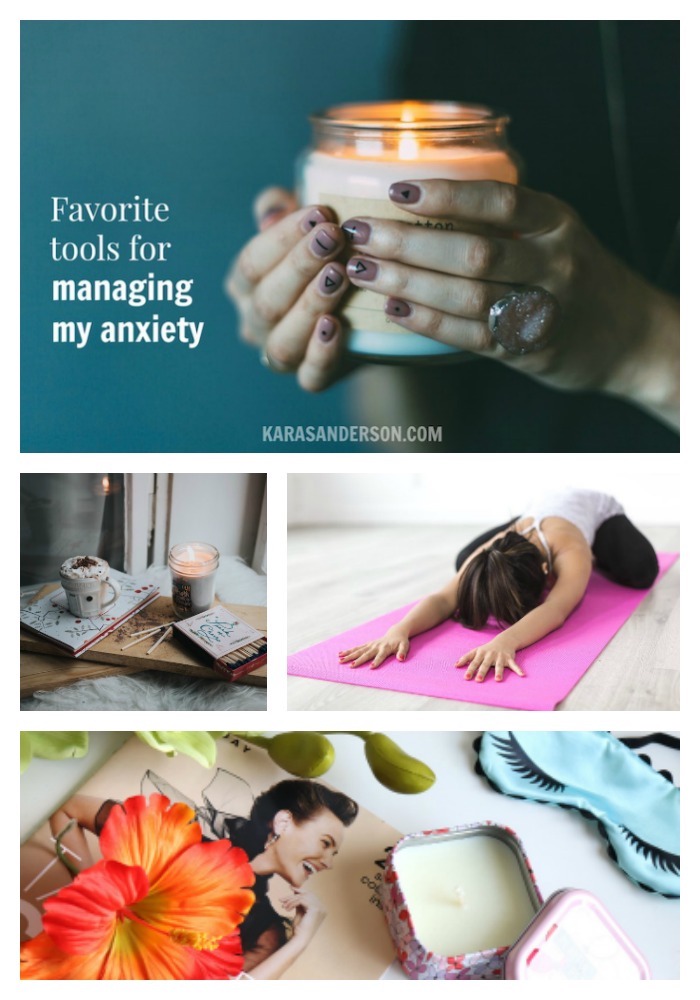
Supplements
I find magnesium really helps my anxiety on a daily basis – especially these.
Keeping up my Vitamin D and Vitamin B levels is also helpful for me. But be sure to check with your doctor about any supplements.
More Magnesium
I tend to keep a lot of my stress in my muscles. So epsom salt baths help a lot. I love these two kinds: Lavender and Rosemary-Mint.
I love all the magnesium.
I also have a neck wrap similar to this one that I love.
Charting
I think it can be really helpful to keep a note of when anxiety is high in a notebook or calendar. About a month ago, I had a stretch of very bad days and it scared me.
My first thoughts were, is my medication not working? Is this my new normal?
But it passed.
Being able to see that things can get really bad but then good again is incredibly helpful to me.
Support for the bad days
Finally, I’d like to talk about the really bad days.
On those days, I need more support and more tools. Here’s what helps:
Breathing
There are lots of breathing techniques that can help when anxiety starts creeping in.
A simple technique is box breathing:
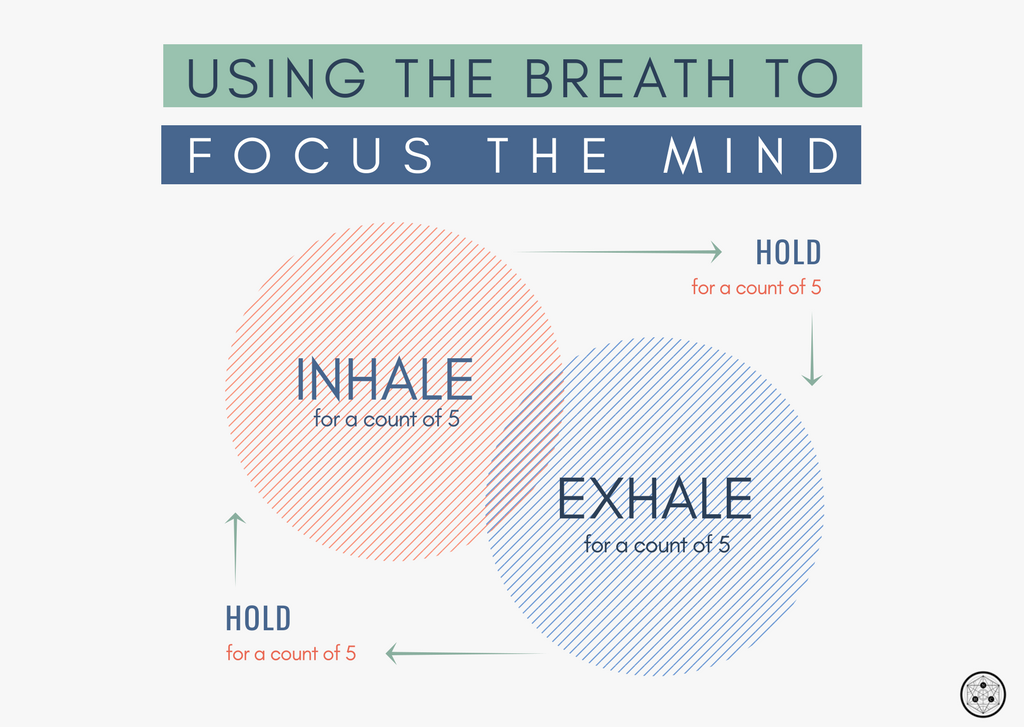
Weighted blanket
This has been a game-changer for me. It helps with my anxiety and my sleep.
When I feel especially panicked, the weight helps me tremendously.
Also, after YEARS of insomnia, I now sleep through the night.
Telling someone
Sometimes it helps to just tell someone I trust.
It helps to say, “I’m having a bad anxiety day.”
I think it helps me lower my expectations for myself to voice it.
Like, “Yup. This is happening. It’s OK, but I need to give this some time.”
Getting help organizing my thoughts
When my anxiety is at its worst, I feel very scattered. Even simple things seem overwhelming, and I can’t organize my day at all.
Sometimes I will call my husband and he’ll help walk me through things.
Making a list also helps a lot.
Sometimes I’ll even tell friends via Voxer.
Having an outside perspective can be so helpful. Friends and family can help you see what’s actually important, and what can wait. They can also offer support to take it easy on yourself on the hard days.
Blocking out noise
Sometimes lots of stimulation makes my anxiety worse.
I’ve been know to go lie down with an eye mask for a few minutes to reset.
It also helps me sometimes to block out noise.
I have these noise-cancelling earbuds and they help so much.
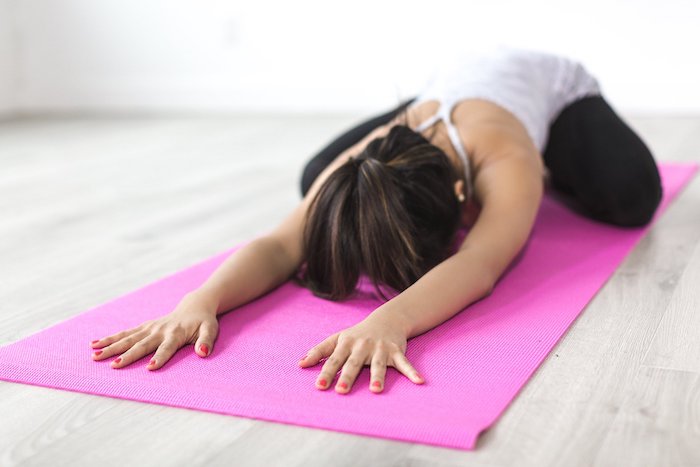
Ginger
Sometimes my anxiety causes my stomach to get upset.
I try to keep a ginger kombucha in the fridge. I also like these.
Eating what I can
So I said above that I try to be careful about what I eat. Unfortunately, when my anxiety is really bad, I sometimes don’t feel like eating.
So I eat what I can. Sometimes that’s crackers.
I know crackers are not a meal, but again, I try to think big picture. One lunch of crackers or toast is not a big deal.
Lowering expectations
I’ve mentioned this above, but when anxiety is really high, we need to lower expectations a lot.
Lower.
Lower.
Maybe a full stop?
Help getting to sleep
If my thoughts are spinning and I can’t calm my mind, these are helpful in getting to sleep. (But again, check with your doctor.)
My emergency list on my phone
You want to make one of these when you are feeling good.
Because the whole reason I made an emergency list on my phone is because when anxiety is high, I can’t think and I can’t Google, for crying out loud.
My emergency list is also known as my Self-Care Can Dos. It’s just a running list of things that might help.
Some are simple:
Drink a glass of water and put your feet up (advice from my midwife while I was pregnant, and experiencing tons of Braxton Hicks contractions, but it helps in all kinds of situations)
I also have direct links to meditations, a gentle yoga class, encouraging talks – I’m looking at you, Brene Brown.

Telling myself that it will pass
I think this is huge.
Sometimes, it feels like anxiety will never get better.
I have had months of anxiety every day. I felt like a mess, a failure … I felt like nothing was helping and I had exhausted my options and I was going to feel awful forever.
I guess the good news is that I’ve had anxiety long enough to know that it comes and goes.
There are also people who can help. It’s just sometimes it takes a lot of work to find those people, and you have to kiss a lot of frogs, and it’s incredibly hard to keep fighting when you feel terrible.
So please, if your anxiety or depression becomes unmanageable, get help right away. Call your doctor, go to the nearest emergency room, or you can call the National Alliance on Mental Health 24/7: 1-800-950-NAMI.
You are important. You are loved. You are worth it. Do not be afraid to ask for help.
It absolutely CAN get better.
